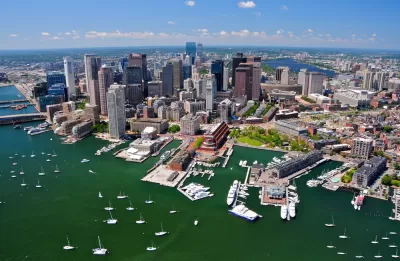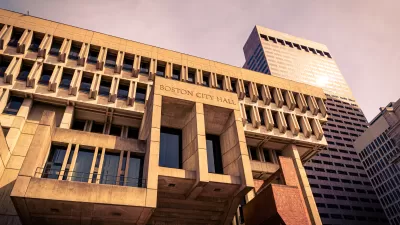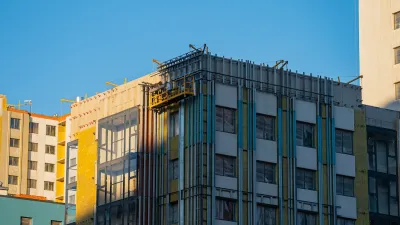As part of the city’s broader climate goals, Mayor Michelle Wu wants to require all new buildings to eliminate the use of fossil fuels.

After Massachusetts Governor Charlie Baker signed a climate bill last week, Boston Mayor Michelle Wu plans to introduce legislation that would eventually eliminate the use of fossil fuels in new construction in the city, where buildings make up roughly 70 percent of the city’s emissions.
As Maria Rachal reports in Smart Cities Dive, “The state law establishes a pilot program that will allow 10 municipalities to create local policies restricting the use of fossil fuels in new construction projects.” At present, Boston would be the 11th city to file a petition, but could be included in the program if other communities fail to meet the program’s requirements. “Those communities include Brookline, a town in the Boston suburbs that voted in 2019 to become the first East Coast town to ban fossil fuel hookups in new buildings but ultimately was not allowed by the state to do so.”
According to the source article, “Boston, a member of the national Building Performance Standards Coalition, last fall adopted a building performance standard that requires all buildings 20,000 square feet or larger to meet certain emissions targets by 2025, and have zero carbon emissions by 2050.” The city will engage in a public input process before determining the final parameters and timelines for making buildings fossil fuel-free.
FULL STORY: Boston aims to eliminate fossil fuels in new buildings

Planetizen Federal Action Tracker
A weekly monitor of how Trump’s orders and actions are impacting planners and planning in America.

Congressman Proposes Bill to Rename DC Metro “Trump Train”
The Make Autorail Great Again Act would withhold federal funding to the system until the Washington Metropolitan Area Transit Authority (WMATA), rebrands as the Washington Metropolitan Authority for Greater Access (WMAGA).

The Simple Legislative Tool Transforming Vacant Downtowns
In California, Michigan and Georgia, an easy win is bringing dollars — and delight — back to city centers.

The States Losing Rural Delivery Rooms at an Alarming Pace
In some states, as few as 9% of rural hospitals still deliver babies. As a result, rising pre-term births, no adequate pre-term care and "harrowing" close calls are a growing reality.

The Small South Asian Republic Going all in on EVs
Thanks to one simple policy change less than five years ago, 65% of new cars in this Himalayan country are now electric.

DC Backpedals on Bike Lane Protection, Swaps Barriers for Paint
Citing aesthetic concerns, the city is removing the concrete barriers and flexposts that once separated Arizona Avenue cyclists from motor vehicles.
Urban Design for Planners 1: Software Tools
This six-course series explores essential urban design concepts using open source software and equips planners with the tools they need to participate fully in the urban design process.
Planning for Universal Design
Learn the tools for implementing Universal Design in planning regulations.
Smith Gee Studio
City of Charlotte
City of Camden Redevelopment Agency
City of Astoria
Transportation Research & Education Center (TREC) at Portland State University
US High Speed Rail Association
City of Camden Redevelopment Agency
Municipality of Princeton (NJ)





























